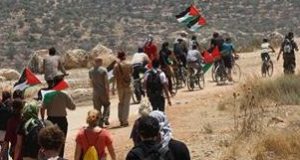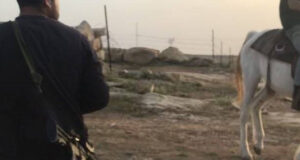By Meron Rapaport
July 4th
http://www.haaretz.com/hasen/spages/595283.html
Are the demonstrations in Bili’in against the separation fence really non-violent, as claimed by their Palestinian and Israeli organizers, or are they in fact violent protests involving the throwing of stones, as charged by the Israel Defense Forces?
As expected, ever since the demonstrations there began, both sides have offered conflicting versions on the issue. Last week, however, a military court ruled that at least in the case before it, IDF soldiers had opened fire while Palestinians and Israelis were demonstrating in a non-violent manner and had not thrown stones. Military Judge Captain Daniel Zamir called for an examination of “the actions of the troops at the scene and the use of the force at its disposal.”
In recent months, the demonstrations in Bili’in have become the focal point of clashes between the IDF and Palestinians over the separation fence. Last Friday saw one such demonstration, with the IDF reporting that one soldier was moderately hurt and the demonstrators reporting 16 injuries, including four Israelis and one disabled individual, by IDF gunfire. A month or so ago, soldier Michael Schwartzman was struck by a rock during a demonstration in Bili’in, resulting in the loss of sight in one eye.
Last Friday, as usual, the Palestinians charged that the shooting started without any provocation on the part of the demonstrators, while the IDF claimed that the shooting began “only after the demonstrators continued to throw stones at the troops despite efforts to end the incident in non-violent ways.”
Some three weeks ago, on June 17, a very similar incident took place in Bili’in. A few hundred Palestinians and Israelis began a march toward the route of the separation fence, which passes through village property and leaves some 2,000 dunams (around half the village’s land) outside the fence. The Bili’in residents, who claim to be inspired by Gandhi’s methods, declared the march a non-violent demonstration. The marchers were stopped by soldiers and Border Police a few hundred meters from the route of the fence.
The demonstration ended with the security forces deploying riot-dispersal means and in the arrest of a number of protesters, including Abdallah Abu-Rahma, one of the leaders of Bili’in’s Popular Committee, and his brother, Ratab, a lecturer at the Al-Quds University and a member of the Seeds of Peace organization.
The indictment against Ratab Abu-Rahma was based primarily on testimony from Wahil Sabit, a border policeman present during the demonstration. Sabit testified that demonstrators started throwing stones at the security forces immediately after the area was declared a closed military zone. Sabit said he saw Abu-Rahma throw stones at the soldiers and then shot him with a sponge bullet.
Sabit was the only policeman who claimed to have seen Abu-Rahma throwing stones.
Abu-Rahma’s attorneys, Tamar Peleg and Gabi Lasky, presented the court with video clips that were filmed during the incident and that show Abu-Rahma asking the demonstrators to walk “slowly, slowly.” Two of the clips show the demonstrators moving the barbed wire barrier set up by the security forces, but not crossing it, only lying down on the road in quiet protest. Immediately thereafter, the soldiers are seen throwing stun grenades and tear-gas canisters toward the demonstrators, without the latter having thrown a single stone.
Abu-Rahma is seen getting to his feet and then immediately being hit with a sponge bullet. Contrary to border policeman Sabit’s testimony, Abu-Rahma is not arrested there and then, but only some time later, after the security forces apprehend his brother and begin beating him. Ratab Abu-Rahma is seen intervening in an effort to help his sibling, and also takes blows from the soldiers.
Judge Zamir upheld all the arguments of the defense, ruling that the demonstration was quiet, that no stone-throwing was seen on the videotapes, and that Abu-Rahma took a blow to his stomach without any provocation on his part. “There was no reason for the defendant’s arrest; there was no reason for the shooting that wounded him or the blows he received from the soldier,” concluded the judge, adding that the reality was “strangely different, to put it mildly, from the testimony of the prosecution witnesses.”
Zamir ordered Abu-Rahma released on bail and advised the prosecution to reconsider its actions against him. The prosecution, however, did not capitulate, and appealed the judge’s decision in a hearing on Thursday. The appeal was rejected.
It emerged during the appeal, however, that a border policeman also filmed the events. This tape has yet to be seen by the prosecution. Until such time, Abu-Rahma remains free.
 International Solidarity Movement Nonviolence. Justice. Freedom.
International Solidarity Movement Nonviolence. Justice. Freedom.



